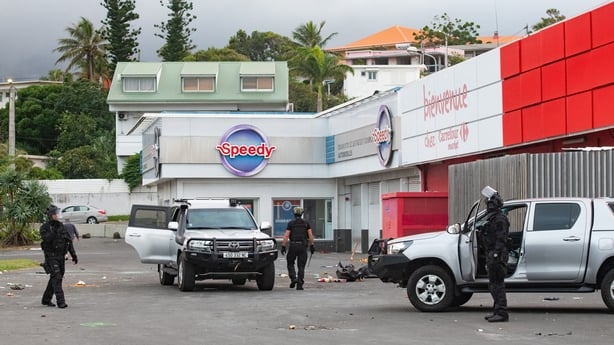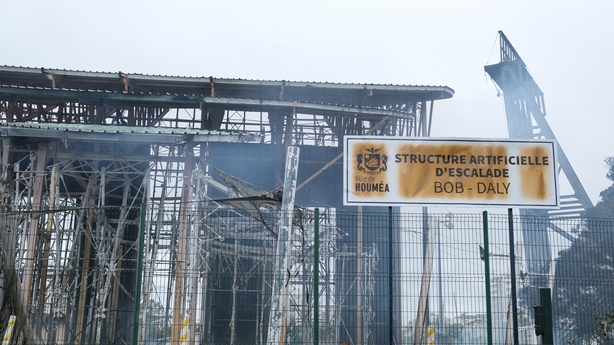France has declared a state of emergency in its overseas territory of New Caledonia after a second night of rioting in which two people were killed and hundreds injured, as anger over constitutional reforms from Paris boiled over.
French President Emmanuel Macron warned that any further violence would be met with an "unyielding" response and called for a resumption of political dialogue to end the unrest which had now claimed three lives, the Élysée said in a statement.
Shops were looted and public buildings torched during last night's violence, the authorities there said.
What began as pro-independence demonstrations has become three days of the worst violence on the French Pacific archipelago since the 1980s.
Despite heavily armed security forces fanning out across the capital Noumea, and the ordering of a nighttime curfew, rioting continued overnight virtually unabated.

Hundreds of people including "around 100" police and gendarmes have been injured in the unrest, French Interior Minister Gérald Darmanin said in Paris.
Overnight, one person was shot dead, but authorities are yet to establish what led to the incident, Mr Darmanin said, adding that dozens of homes and businesses had been torched.
The office of the High Commissioner, France's top representative in New Caledonia, later reported a second death in the riots, without giving any details of the circumstances.
A source familiar with the case told AFP that one gendarme was fighting for his life after being severely wounded by gunshot in Plum, on the southwest coast of New Caledonia.
President Macron cancelled a planned domestic trip and moved today's regular cabinet meeting to hold a crisis meeting with key ministers on New Caledonia, his office said.

In Noumea and the commune of Paita there were reports of several exchanges of fire between civil defence groups and rioters.
Streets in the capital are populated with the shells of burned-out cars and buildings, including a sports store and a large concrete climbing wall.
"Numerous arsons and pillaging of shops, infrastructure and public buildings, including primary and secondary schools, were carried out," the High Commission said.
Why are there riots in New Caledonia against France's voting reform?
Security forces had managed to regain control of Noumea's prison, which holds about 50 inmates, after an uprising and escape bid by prisoners, it said in a statement.
Police have arrested more than 130 people since the riots broke out Monday night, with dozens placed in detention to face court hearings, the commission said.
A nighttime curfew was extended, along with bans on gatherings, the carrying of weapons and the sale of alcohol.
The territory's La Tontouta International Airport remains closed to commercial flights.
As rioters took to the streets, France's lower house of parliament 17,000km away voted in favour of a constitutional change bitterly opposed by indigenous Kanaks.
The reform, which must still be approved by a joint sitting of both houses of the French parliament, would give a vote to people who have lived in New Caledonia for 10 years.
Pro-independence forces say that would dilute the share of the vote held by Kanaks, the Indigenous group that makes up about 41% of the population and the major force in the pro-independence movement.
Mr Macron said French politicians would vote to definitively adopt the constitutional change by the end of June unless New Caledonia's opposing sides agree on a new text that "takes into account the progress made and everyone's aspirations".
After he urged local representatives to soothe tensions, major pro- and anti-independence parties issued a joint statement calling for "calm and reason" to return to the archipelago, adding that "we are destined to keep living together".
Pacific rivalry
Mr Macron has been seeking to reassert his country's importance in the Pacific region, where China and the United States are vying for influence.
Lying between Australia and Fiji, New Caledonia is one of several French territories spanning the globe from the Caribbean and Indian Ocean to the Pacific in the post-colonial era.
In the Noumea Accord of 1998, France vowed to gradually give more political power to the Pacific island territory of nearly 300,000 people.
As part of the agreement, New Caledonia has held three referendums over its ties with France, all rejecting independence.
But the independence movement retains support, particularly among the Indigenous Kanak people.
The Noumea Accord has also meant that New Caledonia's voter lists have not been updated since 1998, depriving island residents who arrived from mainland France or elsewhere since then of a vote in provincial polls.
Pro-independence leader, Daniel Goa, asked people to "go home", and condemned the looting.
But "the unrest of the last 24 hours reveals the determination of our young people to no longer let France take control of them," he added.

